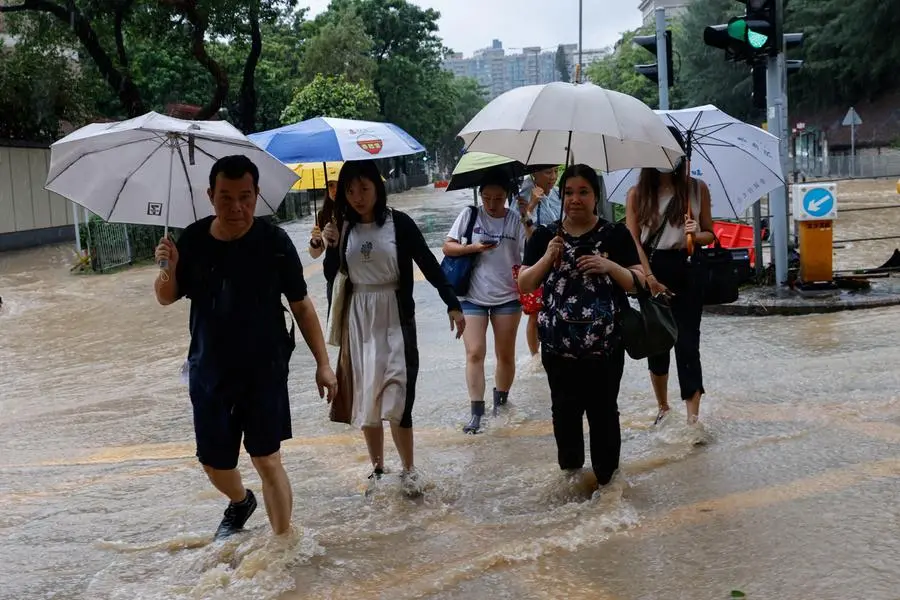PHOTO
HONG KONG - The Asian financial hub of Hong Kong was drenched on Friday by the heaviest rain since records began 140 years ago, killing one person and injuring 83, media reported, as unusually wet weather caused by typhoons brought more disruption to southern China.
Videos showed cascades of water surging down steep hillsides in the former British colony, flooding waist-deep in narrow streets, and inundating malls, metro stations and tunnels.
The extreme weather also brought chaos to the nearby Chinese city of Shenzhen, a tech hub of more than 17.7 million people, with business and transport links across the economically important Pearl River Delta severely hit.
"I've never seen scenes like this before. Even during previous typhoons, it was never this severe. It's quite terrifying," said Hong Kong assistant nurse Connie Cheung, 65.
The torrential rain was brought by Haikui, a typhoon that made landfall in the Chinese province of Fujian on Tuesday. Although it weakened to a tropical depression its slow-moving clouds have dumped huge volumes of precipitation on areas still soaked by rain from a super typhoon a week earlier.
Hong Kong's weather bureau issued its highest "black" rainstorm warning, and said more than 200 mm (7.9 inches) of rain was recorded on Hong Kong's main island, the Kowloon district and the northeastern part of the city's New Territories from late on Thursday.
The city's leader, John Lee, said he was very concerned about the severe flooding in most parts of the territory and had instructed all departments to respond with "all-out efforts".
Hong Kong authorities shut schools on Friday and told workers to stay at home. The city's stock exchange was also shuttered.
Eric Chan, secretary for administration, said the city's transport network was "severely disrupted" and an "extreme conditions situation" would be extended to midnight on Friday.
MTR Corp, which operates the city's rail network, said at least one line was shut while others were operating with delays. One video clip showed metro workers wading waist-deep in a station.
Some roads were partly washed, including a main route to the city's southern beaches. A car was swallowed up by a metres wide pothole when one section of road collapsed, social media pictures showed.
Rescue workers took one person to hospital who was dead on arrival, a television news channel reported.
The city's cross-harbour tunnel, one of main arteries connecting Hong Kong island to Kowloon, was inundated and a shopping mall in the Chai Wan district was half-submerged.
Some passenger and cargo clearance operations at two border points between Hong Kong and Shenzhen were suspended due to flooding.
Macau ferry operators in Hong Kong said several sailings would be suspended to the gambling hub.
More than 100 pigs in an area near the border with Shenzhen drowned in a flood, media reported.
GUANGDONG SWAMPED
The China Meteorological Administration said heavy rain would fall until early Saturday on the central and southwestern areas of Guangdong province.
All schools, some subway stations and offices in the Guangdong city of Shenzhen were shut on Friday.
Residents holding onto safety lines stepped gingerly through knee-deep water in the metropolis of 17.7 million people, videos from state media showed.
A rainfall log showed 465.5 mm (1.5 ft) of rain fell in Shenzhen over a 12-hour period, the highest since records began in 1952.
Daily rainfall in the city in the Pearl River Delta linking Hong Kong to China's mainland was expected to exceed 500 mm, Shenzhen media said.
Videos showed both the exit and entry areas of the Shenzhen railway station were flooded, with trains connecting the city and the provincial capital of Guangzhou suspended. About 100 people were stranded at the station.
Schools in 10 districts of Guangzhou were suspended for the day or had to open late, while the city of Zhuhai near Macau warned of waterlogging and landslides.
The industrial city of Dongguan north of Shenzhen reported its heaviest rain in 15 years.
(Reporting by Tyrone Siu, Farah Master, Edmond Ng, Jessie Pang and Twinnie Siu in Hong Kong and Liz Lee, Albee Zhang and Ryan Woo in Beijing; Editing by Jamie Freed and Michael Perry)





















